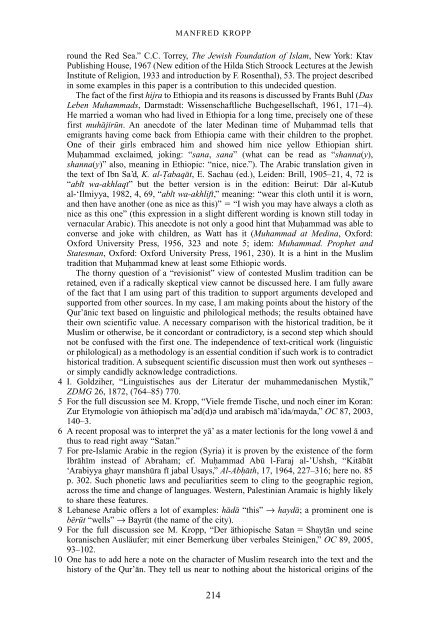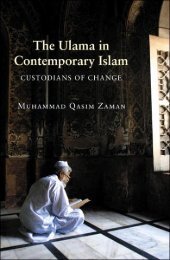The Qur'an in its historical context (pdf - Islam and Christian-Muslim ...
The Qur'an in its historical context (pdf - Islam and Christian-Muslim ...
The Qur'an in its historical context (pdf - Islam and Christian-Muslim ...
Create successful ePaper yourself
Turn your PDF publications into a flip-book with our unique Google optimized e-Paper software.
MANFRED KROPP<br />
round the Red Sea.” C.C. Torrey, <strong>The</strong> Jewish Foundation of <strong>Islam</strong>, New York: Ktav<br />
Publish<strong>in</strong>g House, 1967 (New edition of the Hilda Stich Stroock Lectures at the Jewish<br />
Institute of Religion, 1933 <strong>and</strong> <strong>in</strong>troduction by F. Rosenthal), 53. <strong>The</strong> project described<br />
<strong>in</strong> some examples <strong>in</strong> this paper is a contribution to this undecided question.<br />
<strong>The</strong> fact of the first hijra to Ethiopia <strong>and</strong> <strong>its</strong> reasons is discussed by Frants Buhl (Das<br />
Leben Muhammads, Darmstadt: Wissenschaftliche Buchgesellschaft, 1961, 171–4).<br />
He married a woman who had lived <strong>in</strong> Ethiopia for a long time, precisely one of these<br />
first muhajirun. An anecdote of the later Med<strong>in</strong>an time of Muhammad tells that<br />
emigrants hav<strong>in</strong>g come back from Ethiopia came with their children to the prophet.<br />
One of their girls embraced him <strong>and</strong> showed him nice yellow Ethiopian shirt.<br />
Muhammad exclaimed, jok<strong>in</strong>g: “sana, sana” (what can be read as “shanna(y),<br />
shanna(y)” also, mean<strong>in</strong>g <strong>in</strong> Ethiopic: “nice, nice.”). <strong>The</strong> Arabic translation given <strong>in</strong><br />
the text of Ibn Sa’d, K. al-Tabaqat, E. Sachau (ed.), Leiden: Brill, 1905–21, 4, 72 is<br />
“abli wa-akhlaqi” but the better version is <strong>in</strong> the edition: Beirut: Dar al-Kutub<br />
al-‘Ilmiyya, 1982, 4, 69, “abli wa-akhlifi,” mean<strong>in</strong>g: “wear this cloth until it is worn,<br />
<strong>and</strong> then have another (one as nice as this)” � “I wish you may have always a cloth as<br />
nice as this one” (this expression <strong>in</strong> a slight different word<strong>in</strong>g is known still today <strong>in</strong><br />
vernacular Arabic). This anecdote is not only a good h<strong>in</strong>t that Muhammad was able to<br />
converse <strong>and</strong> joke with children, as Watt has it (Muhammad at Med<strong>in</strong>a, Oxford:<br />
Oxford University Press, 1956, 323 <strong>and</strong> note 5; idem: Muhammad. Prophet <strong>and</strong><br />
Statesman, Oxford: Oxford University Press, 1961, 230). It is a h<strong>in</strong>t <strong>in</strong> the <strong>Muslim</strong><br />
tradition that Muhammad knew at least some Ethiopic words.<br />
<strong>The</strong> thorny question of a “revisionist” view of contested <strong>Muslim</strong> tradition can be<br />
reta<strong>in</strong>ed, even if a radically skeptical view cannot be discussed here. I am fully aware<br />
of the fact that I am us<strong>in</strong>g part of this tradition to support arguments developed <strong>and</strong><br />
supported from other sources. In my case, I am mak<strong>in</strong>g po<strong>in</strong>ts about the history of the<br />
Qur’anic text based on l<strong>in</strong>guistic <strong>and</strong> philological methods; the results obta<strong>in</strong>ed have<br />
their own scientific value. A necessary comparison with the <strong>historical</strong> tradition, be it<br />
<strong>Muslim</strong> or otherwise, be it concordant or contradictory, is a second step which should<br />
not be confused with the first one. <strong>The</strong> <strong>in</strong>dependence of text-critical work (l<strong>in</strong>guistic<br />
or philological) as a methodology is an essential condition if such work is to contradict<br />
<strong>historical</strong> tradition. A subsequent scientific discussion must then work out syntheses –<br />
or simply c<strong>and</strong>idly acknowledge contradictions.<br />
4 I. Goldziher, “L<strong>in</strong>guistisches aus der Literatur der muhammedanischen Mystik,”<br />
ZDMG 26, 1872, (764–85) 770.<br />
5 For the full discussion see M. Kropp, “Viele fremde Tische, und noch e<strong>in</strong>er im Koran:<br />
Zur Etymologie von äthiopisch ma’7d(d)7 und arabisch ma’ida/mayda,” OC 87, 2003,<br />
140–3.<br />
6 A recent proposal was to <strong>in</strong>terpret the ya’ as a mater lectionis for the long vowel a <strong>and</strong><br />
thus to read right away “Satan.”<br />
7 For pre-<strong>Islam</strong>ic Arabic <strong>in</strong> the region (Syria) it is proven by the existence of the form<br />
Ibrahim <strong>in</strong>stead of Abraham; cf. Muhammad Abu l-Faraj al-’Ushsh, “Kitabat<br />
‘Arabiyya ghayr manshura fi jabal Usays,” Al-Abhath, 17, 1964, 227–316; here no. 85<br />
p. 302. Such phonetic laws <strong>and</strong> peculiarities seem to cl<strong>in</strong>g to the geographic region,<br />
across the time <strong>and</strong> change of languages. Western, Palest<strong>in</strong>ian Aramaic is highly likely<br />
to share these features.<br />
8 Lebanese Arabic offers a lot of examples: hada “this” → hayda; a prom<strong>in</strong>ent one is<br />
berut “wells” → Bayrut (the name of the city).<br />
9 For the full discussion see M. Kropp, “Der äthiopische Satan � Shaytan und se<strong>in</strong>e<br />
koranischen Ausläufer; mit e<strong>in</strong>er Bemerkung über verbales Ste<strong>in</strong>igen,” OC 89, 2005,<br />
93–102.<br />
10 One has to add here a note on the character of <strong>Muslim</strong> research <strong>in</strong>to the text <strong>and</strong> the<br />
history of the Qur’an. <strong>The</strong>y tell us near to noth<strong>in</strong>g about the <strong>historical</strong> orig<strong>in</strong>s of the<br />
214



